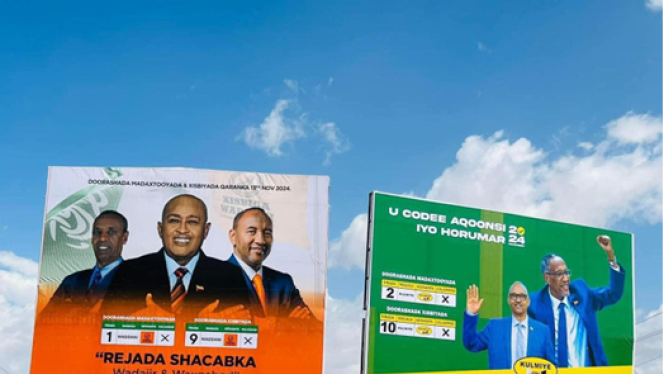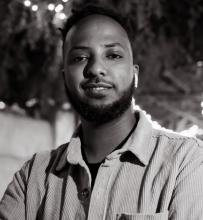Friday 18 October 2024
Somaliland elections: Kulmiye vs Wadani on foreign policy

Somaliland’s two leading political parties have competing visions for the republic’s place in the world. The winner of the November elections will have a strong mandate to either maintain Somaliland’s current course or reform its foreign relations.
Next month, Somaliland will once again hold a presidential election, scheduled by the National Electoral Commission (NEC) for 13th November following a protracted struggle among the political elite that led to some outbreaks of violence.
These upcoming elections carry significant international and regional implications, as well as local ones. Somaliland is at the centre of major geopolitical shifts shaping politics in the Horn of Africa. Earlier this year, Hargeisa signed a memorandum of understanding with Addis Ababa, granting Ethiopia access to the sea in exchange for recognition, which provoked anger in Somalia, prompted interest from Turkey, and gave Egypt an opportunity to leverage its influence with Ethiopia as the GERD negotiations collapsed.
In mid-October, Egypt signed a trilateral pact with Somalia and Eritrea, with an image of the three countries’ foreign ministers alongside Abbas Kamel, Egypt’s spy chief, circulating online holding their hands. These countries have been brought together around their shared opposition to Abiy Ahmed’s new foreign policy direction for Ethiopia and the risks it poses to their security interests.
Somaliland has developed its own set of relationships which give it leeway in the international arena. It maintains close ties with the United Arab Emirates (UAE), which has heavily invested in and expanded the Berbera port and airport, and funded the construction of the Berbera-Wajaale corridor, linking Somaliland’s maritime hub to Ethiopia.
Somaliland has also become an avenue in the geopolitical competition between the United States and China. The United States has sought to reduce its heavy reliance on Djibouti as a military hub in Africa and has long recognised Somaliland's strategic significance, leading to multiple visits and engagements by officials from the State and Defence Departments with security personnel in Hargeisa and Berbera.
Meanwhile, China had previously shown interest in developing the port of Berbera and the corridor connecting it to Ethiopia, but the project was later overtaken by the Emirati company DP World. Additionally, Beijing is displeased with Somaliland's relationship with Taiwan, which has persisted despite diplomatic pressure from China. Hargeisa has been defiant on this issue, with its foreign minister, Essa Kayd, saying the country was “born free”, adding: “Other countries cannot dictate who we are going to be”.
What does all this mean for Somaliland's presidential elections, and how can we understand the candidates and their parties’ perspectives on these issues?
Contenders and their issues
The fiercest competition is between President Muse Bihi Abdi of the ruling Kulmiye party and Abdirahman Mohamed Abdillahi (Irro) of the Wadani opposition party. The third presidential candidate is Faisal Ali Warabe from the UCID party, although he does not pose a significant threat to either the incumbent or the Wadani party. While political parties in Somaliland have been accused of lacking solid political ideologies to rally their supporters, we can observe, at least on the surface, a divergence in significant domestic and foreign policy questions.
The memorandum with Ethiopia is central to President Bihi’s bid for re-election. His campaign team has chosen the slogan “U codee Aqoonsi iyo Horumar,” which translates to “Vote for recognition and development”. This may be the only significant aspect on which the ruling party is basing its campaign. The party has faced some of the most challenging crises in Somaliland's recent history, including a global pandemic, droughts, the destruction of the major market in Waaheen, and a conflict that erupted in the eastern region of Sool.
Opposition parties have all critiqued the government’s approach to these developments in the country. For their part, Wadani party officials questioned the government’s mandate to engage in the agreement with Ethiopia. A statement released by the party called for the government to present the agreement to parliament for ratification, emphasising that they would only accept something that is deemed legal and follows due process.
The deal has also unsettled the previously cordial relations between Somaliland and Djibouti. Since its announcement, the Djiboutian government has expressed its disagreement with the memorandum of understanding and has backed Somalia against Ethiopia. As a result, both sides have accused each other of destabilising the region. According to an Africa Intelligence report, Bihi has accused Djibouti of recruiting fighters opposed to Somaliland’s rule in its western region. Meanwhile, officials from the Wadani party have maintained that relations between Somaliland and Djibouti are strong and should remain so.
Somaliland's relationship with Taiwan is another point of contention between the two politicians. In July 2020, Taiwan and Somaliland announced the establishment of a diplomatic partnership centred on mutual developmental cooperation. The Wadani party opposed this relationship, arguing that it is unwise to antagonise a major power like China by engaging with Taiwan. For its part, the government maintained that relations with Taiwan are important for strengthening ties with friendly western nations, particularly the United States. However, sentiments shared by opposition politicians and even some unaffiliated figures have questioned whether provoking China was the right approach in establishing relations with Taiwan.
The United Arab Emirates is another influential factor in Somaliland’s foreign relations. The Gulf nation considers Somaliland one of its allies in the region and, in return, has invested in port infrastructure and built the airport. It was during the previous Kulmiye government under Silanyo that relations with Abu Dhabi were established. The Wadani party opposed the military lease to the UAE in 2016 and the development of the Berbera port by DP World in 2018, criticising the government’s handling of the port agreement. According to party officials, the latter deal is not legally valid as it has not been ratified by parliament, and more importantly, it deprives Somaliland of control over its sole export-import hub. The UAE is believed to support the Ethiopia-Somaliland agreement, given its investment in expanding the Berbera port and its economic interests in Ethiopia.
Predicting how these dynamics will evolve is challenging, given the ever-changing nature of regional politics. If Kulmiye retains power, we may see the consolidation of the current status quo and a continuation of the existing foreign policy, particularly in relation to Ethiopia and the UAE.
Conversely, a Wadani-led government might aim to maintain ties with Ethiopia and the UAE, recognising their importance as security and economic partners, respectively. It will be interesting to see how a new Wadani administration might approach Somaliland-Taiwan relations, given its past willingness to strengthen ties with China.
Meanwhile, the UCID party, which has largely aligned with the ruling Kulmiye party on most foreign policy issues, is likely to support the continued prioritisation of Somaliland's traditional allies and maintain a less-than-friendly relationship with Djibouti.
Regional and international powers are closely watching the outcome of these elections. The results will either introduce new policy directions for Somaliland or reinforce existing partnerships and relations. The extent of foreign intervention or meddling in the elections remains unclear, if not negligible, aside from speculation and theories suggesting that some regional actors may favour different candidates, as they have in the past. Whatever the case, the truth is likely to emerge in due course.







